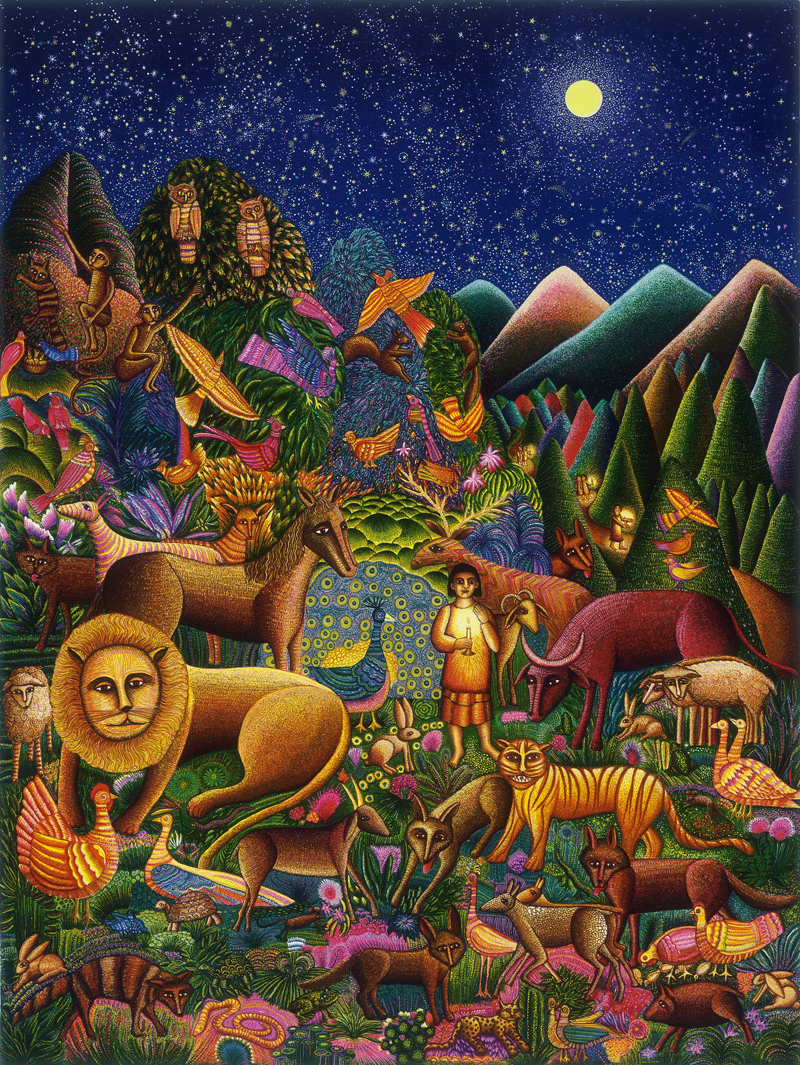the leopard shall lie down with the kid,
the calf and the lion and the fatling together,
and a little child shall lead them.
The cow and the bear shall graze,
their young shall lie down together;
and the lion shall eat straw like the ox.
The nursing child shall play
over the hole of the asp,
and the weaned child shall put its hand
on the adder's den.
They will not hurt or destroy
on all my holy mountain;
for the earth will be full
of the knowledge of the LORD
as the waters cover the sea.
The wolf shall live with the lamb,
the leopard shall lie down with the kid,
the calf and the lion and the fatling together,
and a little child shall lead them.
- Isaiah 11:6-10

Peaceable Kingdom
John August Swanson, 1994
My dear friends,
Isaiah 11:6-10, read on the second Sunday of Advent, presents a profound and harmonious vision that resonates deeply with both Christian and Buddhist teachings. It describes a peaceable kingdom, a transformation of the natural order where predatory instincts give way to harmony and understanding. This vision is not merely an ecological utopia, but a metaphor for the transformation of the human spirit and society.
In Christian tradition, this passage is often seen as a prophecy of the coming of Christ, the "root of Jesse," who brings peace and reconciliation, not through force, but through humility, love, and wisdom. The image of a "little child" leading beasts of prey symbolizes a leadership grounded in humility and gentleness, rather than power or fear.
Buddhist teachings also resonate with this imagery, particularly in the concept of taming the mind. Just as the lion and the lamb lie together in peace, so too can our own inner conflicting natures – the aggressive and the gentle, the fearful and the brave – be brought into harmony through the cultivation of wisdom, compassion, and mindfulness. The harmful instincts of animals in Isaiah's vision parallel the psychic poisons in Buddhism: ignorance, attachment, and aversion. These are the root causes of dukkha, or suffering, and their transformation is key to achieving inner peace and enlightenment.
The assertion that "the earth will be full of the knowledge of the LORD as the waters cover the sea" speaks to the transformative power of spiritual wisdom. In both traditions, true knowledge is not merely intellectual understanding, but a deep, experiential wisdom that permeates one's being and actions. For Christians, this knowledge is an intimate understanding of God's love and will, leading to a life of compassion and righteousness. In Buddhism, this equates to the profound realization of the nature of reality, characterized by emptiness and interdependence, leading to the cessation of suffering and the cultivation of compassion for all sentient beings.
This vision from Isaiah offers a powerful message of hope and transformation. It invites us to imagine a world transformed by divine wisdom and compassion, where harmful instincts and actions are tamed not through suppression, but through understanding and love. Let us seek to embody these qualities in our own lives, finding skillful means to build a world where peace and harmony prevail.